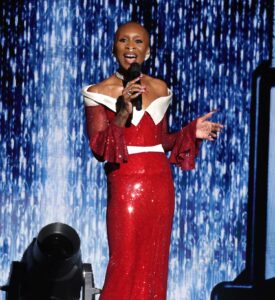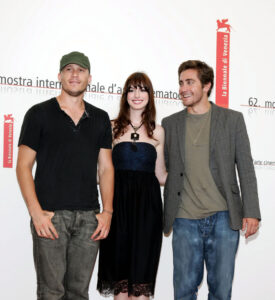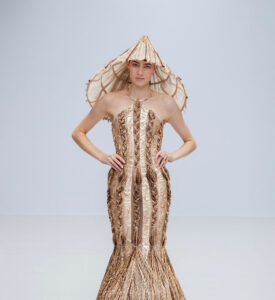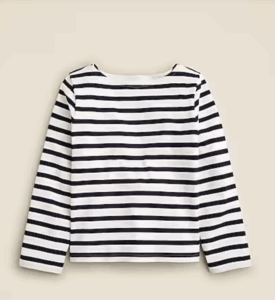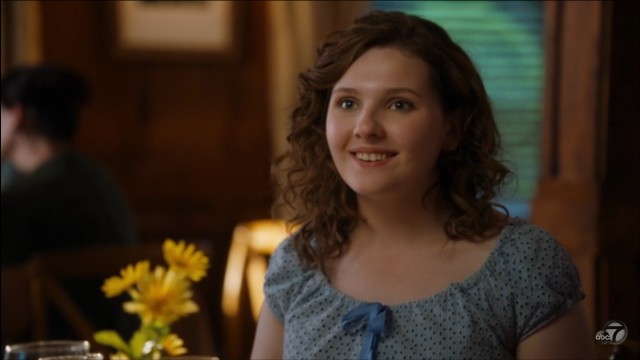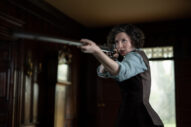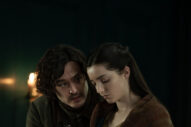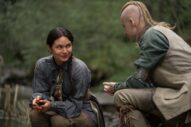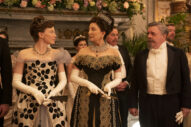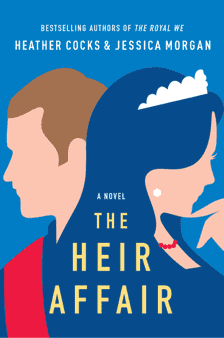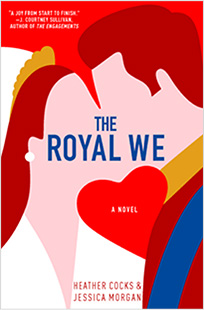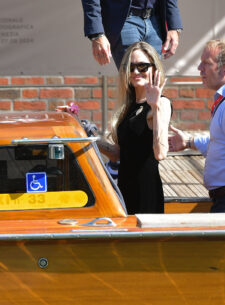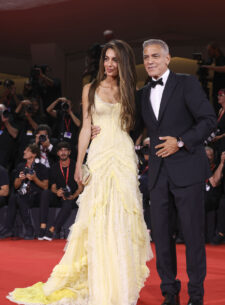Like most kids who grew up in the ’80s — the era of Jeannie Bueller, Red Dawn, and that first incarnation of North and South — I love Dirty Dancing. As a very ordinary but smart kid who was about 10 when it came out, it tapped into all my romantic fantasies of a heroic and talented and sculpted dreamboat seeing something special in little me. (This was obviously before I grew up and realized no lady needs to be chosen; she gets to choose.) The dancing is fantastic; the romantic angst and longing and the joint agony and ecstasy of the ending were all perfect, and it captured that other part of Young Me who wished she too could throw off her own shackles and dazzle everyone with a heretofore undiscovered secret talent. And it’s one of the first movie soundtracks I ever owned. I recall being so blown away when I learned Patrick Swayze sang “She’s Like The Wind” in addition to all that dancing (“He’s SO TALENTED,” I’m sure I thought, gaping — that same wonderstruck part of me that delighted in pointing out Huey Lewis’s cameo in Back to the Future to anyone who didn’t know). Kevin said to me the other day, “It’s a WET RAG OF A SONG.” A pox on you, sir. If it’s a wet rag of a song, then it’s MY wet rag of a song.
So obviously, ABC had a mountain to climb with me when it announced a remake. But the recent rash of musicals on TV have at least stoked our national affection with the genre, even if those particular productions didn’t always succeed, so I thought maybe — just maybe — this one would work out, or at the very least not embarrass itself.
Oy.
Now, in fairness, I had read the reviews and spoken to one friend who watched it, so I knew the score before I watched. That also lowered the bar to where it could’ve been much easier for Dirty Dancing 2.0 to clear, but alas, there are a lot of strange problems with this production. Let’s run down the majors, here, and use the slideshow for some good old-fashioned ogling.
The chemistry is a disaster. This, right here, is a massive problem. Abigail Breslin and Colt Prattes have all the sexual temperature of a bucket of ice water being thrown onto a tree. The magic of the original lay in part with the sparks between Jennifer Grey and Patrick Swayze, two actors who supposedly hated each other from their collaboration on Red Dawn and who were thrown together for the cast’s notoriously steamy, long, hormonally intense rehearsal sessions for the dances. It’s the kind of thing you luck into, rather than mix in a lab, and yielded that perfect alchemy that is Baby and Johnny: admiration turned to anger turned to lust; contempt turned to respect turned to… well, lust. Those two have all the feelings about each other, and possibly their portrayers did too at one time or another, and voila: It works. Imagine Dirty Dancing with any other actress of that day in the lead — Mia Sara, Molly Ringwald, Ally Sheedy. You can’t. And it’s because that kind of heat isn’t plug-and-play.
The script is a total mess. The first transgression: “I carried his watermelon.” No. It’s, “I carried a watermelon.” If you’re going to tear out some lines straight from the source, you’d best tear them out cleanly.
Also, it subtracts moments where Baby and Johnny should be developing chemistry, and replaces them with Penny teaching Baby how to shimmy — a connection that no longer needed deepening, because by that point Baby had already put herself on the line for Penny. Perhaps this was an attempt to justify Nicole Scherzinger’s salary, or maybe no scenes were deleted and this was simply an attempt to pad out the movie to three hours. But it’s time we badly needed to spend seeing Baby and Johnny connect, and establishing his fascination with her mind and her moxie; maybe, therefore, it became pallative care for the fact that Breslin and Prattes simply could not clear any of those bars. This whole movie is about moving toward someone or something, about the inexorable pull of adulthood, but Dirty Dancing 2.0 forcibly shoves apart its leads.
Weirder still, the movie occasionally wants to be a musical. Scherzinger and Breslin duet, Johnny performs live at the staff-only after-hours party, and a new love interest for Baby’s sister Lisa is also a musician. Bruce Greenwood sings. The final number, “I Had The Time Of My Life,” is presented here as a sort of live all-skate in which everyone gets to sing a piece. Earlier, in the throes of her marital discord, we grind to a halt for Debra Messing to perform — in front of the entire Kellerman’s crowd — a maudlin rendition of “You Can’t Take That Away From Me” during which we’re hard-pressed to care about her emotional arc at all. (Grace Adler’s big trait on Will & Grace was believing she could sing, though she could not; Messing’s performance of those scenes, and songs in future shows, always suggested to me that she had no idea this was drawn from life.) And horny trophy wife Vivian Pressman, revamped as a horny divorcee and cast with Katey Sagal, gets a showy rendition of “Fever” with Johnny on the Kellerman dance floor. This is absurd for a couple reasons, one of which is that Kellerman himself is supposedly against fraternization between the guests and the staff — or rather, as was my interpretation, aware it was happening but against it being obvious lest it upset any of the rich guests. Another is that it’s abundantly clear Kellerman’s is a hugely square family vacation spot, so Vivian and Johnny grinding and rubbing on each other while everyone claps (except Bruce Greenwood, who storms out complaining that it’s vulgar) completely clashes with the culture that’s been established. And finally, between Vivian and Marjorie/Debra, does bandleader Billy Dee Williams not get so annoyed at guests deciding they can just show up and sing whenever they want? Oh, and…
The bandleader is Billy Dee Williams. You can bet Lando Calrissian asked ABC not to promote that one. And as far as I can tell, they obliged him.
Casper Smart is also in this. Yes, Jennifer Lopez’s ex, Casper Smart — sorry, Beau Casper Smart. They cast him as Johnny’s cousin — he o’ the watermelons — and while he’s perfectly fine, he doesn’t dance. Oh, he might turn up in the background of some group numbers, but ABC managed to stunt-cast that part with an experienced dancer and then do nothing about it.
The trouble with the Houseman parents. Jerry Orbach and Kelly Bishop always read, to me, like a pure and purely oblivious couple of that era. I didn’t need inner or outer life from them. Debra Messing and Bruce Greenwood are given marital troubles — “You haven’t touched me in a year,” and, “I’d rather be alone than lonely” — and we’re forced to sit through conversations nobody cares about, between two characters who are far from the action that matters. (And who, it’s fair to say, you can TELL have never touched each other. Sometimes it feels like they shot all their scenes separately on different days, even when they are demonstrably standing together in the same frame. That is an achievement.) This misguided focus on them makes me wonder: For whom was this remake, exactly? Their storyline suggests a pandering to the now-adults who were kids when the original debuted, as if we’re now so aged that we’re incapable of enjoying or relating to a younger person’s love story, and demand Midlife Crisis Strife on the side.
The update also brings a bit too much of the modern “lay it all bare” sensibility. Remember that glorious moment in which Jerry Orbach, having handed Robbie the Snake an envelope of cash, learns Robbie ditched a pregnant Penny pregnant and coolly rips that envelope back out of Robbie’s hand like he’s radioactive, walking away with nothing but a glare that’s deafening in its silence? Bruce Greenwood takes back the envelope, yes, but then he stands there awhile and monologues about Robbie’s treachery before demanding he pay back Penny for the abortion and threatening to torpedo Robbie’s medical career. He also unloads all his feelings on Debra Messing, which is unpleasant in part because her idea of looking moved is to set her jaw and glare at her scene partner, and lectures Penny about her life choices in addition to all the talking he does with Baby. Jerry Orbach did better with fewer words. He felt like a dinosaur watching his era die out.
The trouble with Lisa Houseman. Lisa’s entire character arc is that she channels her grief into the ukelele while also solving race relations in 1963 America. No, really.
Being slightly more expansive about it, Dirty Dancing 2.0 dispenses with the meat of Lisa’s original story in favor of regurgitating Baby’s: Both girls end up associating with staff members who are warned that this will lead to them getting fired, and both girls end up finding their moxie and performing publicly with their verboten partners. Indeed, Lisa’s triumph not only immediately precedes Baby’s, but outshines it, making her parents’ impressed reaction to Baby seem totally absurd. In terms of screen time, Hyland gets barely a fraction, but yet she’s practically in direct competition with our lead.
In the original, Lisa Houseman is matched with oozing waiter Robbie, until he gets fresh with her halfway through and she storms off in a justified tizzy. (It prompts one of my favorite Neil Kellerman lines and deliveries; when Baby witnesses the end of the argument, Neil puts his arm around her and says with the kind of patronizing self-importance that suggests he’s pretty sure he’s wise, “Sometimes [pause] we see things [pause] we don’t want to see.”) Here, right off the top, they go on one campfire date after-hours and flirt about getting married before she gives him the heave. Thereafter, she decides to read The Feminine Mystique. She also stumbles on one of the African-American band members, a kid named Marco, playing and singing and decides that although she is completely unmusical, maybe she can learn an instrument for the talent show. Sure, fine. THEN, she overhears her mother demanding a divorce and dissolves into tears, and begs Marco to help her find Baby because their lives are about to be over. Sincerely, that is her level of melodrama. And yes, in the sixties, divorce was less easy than it is now, but there are also divorcees all over that place. (I wanted her to sit down with Vivian Pressman for a Get-a-Grip talk, rather than Debra Messing getting one.) It would’ve been great if Marco had patted her on the head and then said, “I’m so sorry your parents are fighting, but: civil rights. Byeeee.” Instead, we don’t see them again until they perform together, at which point Billy Dee Williams and Max Kellerman cluck about how times really are changing, and maybe that’s a grand thing, all because of this brave tiny white girl. What?!? No.
The trouble with time. Other than montages, which Trey Parker and Matt Stone famously heralded through song as a great way to signify that days are ending and beginning, there is no sense of how much time is passing. Case in point, which ties to the former paragraph: At the talent show, in what feels like two days after Billy Dee caught Marco handing Lisa her first ukelele and ordered him to stay away from Lisa, we’re treated to Lisa perkily perching at the mic and saying, “I’m still rusty,” before calling a surprised Marco up to play with her — and then plucking and singing a perfect duet. Why does Marco look surprised? Obviously they’d practiced, and she’d told him from the jump that she wanted to learn for the talent show. But the thing is… did they ever practice? I thought Lisa wasn’t musical. How is she suddenly flawlessly harmonizing? When did this happen? And why didn’t we see more of it? Again, y’all, if you’re going to go there, THESE TWO ARE THEIR OWN MOVIE, not simply three scenes in this one.
However, I’ll say this: Sarah Hyland and newcomer J. Quinton Johnson sounded great together and I would download that single. He had charisma. We should’ve seen more of him.
The trouble with Vivian Pressman. To be fair, I can’t remember exactly how Vivian is treated in the original, other than she does a lot of shimmying with Johnny while her husband plays poker and then jealously tries to implicate him in some wallet theft. But I liked the way Vivian initially totally owned her freedom. She’s not married; she can do as she pleases, and she extols the virtues of her self-actualization to a querulous Debra Messing. So then what happens? She is clingy with Johnny and begs him to stay with her — “I can’t sleep alone,” she mewls — and then, when he ghosts her, she plants a watch in his cabin and claims it was theft. And thus, the movie undoes all the work this did do to give Katey Sagal a meatier and more progressive role. Johnny also dismissively refers to her as a Bungalow Bunny, a term I vaguely recall from the original, when Vivian — rather than Debra — was painted as the overlooked wife trying to make her own fun in a lonely life. That Vivian was hungry, but with underlying sadness. This Vivian is initially created as sexually liberated and confident, all things to admire, and then the script — from the mouth of the guy who’s supposed to be our hero, no less — punishes her for it. (I want to say it was Max Kellerman who used it in the original, a character you’d believe would happily take her money and then turn around and eyeroll her.)
Abigail Breslin is honestly not that bad. I know that sounds lukewarm, but hear me out. Abigail got handed a lousy script. When Jennifer Grey finally rips into Swayze for being a jerk of a teacher (“I’m doing all this to save your ass; what I really want to do is drop you on it”), the moment plays as one more way in which he starts to see her as a person that contains multitudes. They are toe-to-toe, if not eye-to-eye. That speech, that explosion of emotion, is absent. Their other heated exchange in the original is when Baby finally goes to Johnny’s cabin after Penny’s abortion. He insists she doesn’t know what it’s like to be scared, and she frantically shouts, “Me? I’m scared of everything. I’m scared of what I saw, I’m scared of what I did, of who I am. And most of all I’m scared of walking out of this room and never feeling the rest of my whole life the way I feel when I’m with you.” When those words leave her mouth, and they look at each other, you know it’s on. And it IS. In this version, when she goes to his room, the talk is very quiet. She just begs him to dance with her one last time because it all went so fast for her that night — this, after Penny almost died. The first script plays on the unease of how fast Baby is growing up in the span of one week; the new one is just, “Me me me.” She doesn’t yell at him until later, and even then, it’s to a closed door. REALLY hard to create tension with your leads that way.
But what Breslin does get right is a coltish unease with herself. Because she’s not the experienced dancer Jennifer Grey was, obviously Breslin couldn’t just kill time feigning degrees of badness before her shining finale. Her problem was the reverse: She actually had to work at getting better, but clearly couldn’t quite get to the heights the show needed, and so the pivotal dance numbers lack triumph. This means there’s actually a fair bit of realism to the dance lesson scenes. It actually feels like we’re watching someone try to figure this out on a deadline.
Further, though Breslin never comes off as an academic striver or a true Daddy’s Girl the way Grey did, when she gazes at Johnny and the dancers — and nerdily tries to mimic some of their moves on the way home — it feels enormously relatable. This Baby has no idea what to do with her body and no chill at all about the fascination leaking from her eyes every time she gets a load of how these people move together. Breslin’s Baby is a girl who probably hadn’t even noticed that she was coming into her curves, much less ever considered their power.
But, though she was game and she can act — Breslin is better when she’s crying than in most other moments — she isn’t a singer or a dancer. It’s hard to be in a semi-musical dance movie without a solid grounding in either skill, and when you’re not getting a whole lot from your most important scene partner.
Colt Prettis is that bad. I feel terrible for him, too, because I’ve read the interviews about how badly he didn’t want to screw this up because his mother is a huge fan. And Prettis can dance — though he’s no Swayze — and he can sing, but he can’t carry a movie on the sheer force of his masculine mystique. There is an entire scene in his room, the one where he delivers his tragic hardscrabble backstory right before he and Baby boff, in which his lines are delivered in profile and in shadow. He is staring at Baby, and we are staring at his jaw. This must be an attempt to cover that the emotion never reaches his giant eyes — and they are big; there’s even a joke about them written into the script — but it also completely distances us from both him and from them.
Prettis also plays Johnny as angry. Too angry. There’s a difference between putting up walls as a defense mechanism and just stomping around looking pissed all the time, and his instrument isn’t tuned to that nuance. But how much of it can be blamed on him? After all…
Johnny Castle is a tough part to cast — and in fact, so are many of the others. His age, and indeed Penny’s, is always the big question mark. Just how old is Johnny Castle supposed to be? He has to be old enough to hold his own against Vivian, but young enough that it’s not distractingly creepy when he and Baby fall in love. Swayze gave Johnny Castle that magical ageless quality. The sense of fun and earnestness that develops in his eyes aged him down; his sexual energy matures him. You can roll with him in either pairing, and it helps that Grey could leak a bit of her own worldliness into the role where necessary.
Abigail Breslin is far better casting for Baby than she is for Ms. Frances Houseman, which means she can’t offset Johnny’s nebulous age. Swayze was 35 when he filmed this movie and Jennifer Grey was 27; that’s an eight-year gap, which on the surface isn’t much different than the 10-year gap between Breslin and Prettis. But Breslin, at 21, looks 15 (they repeated so often that she was headed to college, and I wonder if that was a network note, because she legit doesn’t even look old enough to drive), and Prettis’s 31 reads more like 38 through this production’s lens. When he gets up on-stage at the end and professes his love for her, I kept expecting the cops to arrest him.
Nicole Scherzinger, who actually is 38, also somehow looks much tireder and older in this telecast (despite being one of its bright spots; she’s warm, and a fabulous dancer). The fact that Robbie is played by an age-appropriate-for-the-character 24-year old, and Sarah Hyland at 26 convincingly plays 20, makes for a bizarre love triangle in the vein of Baby-Johnny-Vivian — and also fails to sell that Penny slept with Robbie because she believed his sweet nothings. Penny, in demeanor and otherwise, comes across as far too experienced and world-weary to believe a horny twentysomething waiter when he tells her it’s love. When it was Cynthia Rhodes (31), Jane Brucker (29), and Max Cantor (28), it all read a bit more logically; Rhodes gave Penny a youthful hope that the world was still out there waiting for them. Scherzinger just seems Over It.
Neil Kellerman rules. In both versions. That’s another problem with this one. Neil is deliciously smarmy and terrible in the original. The whole scene where he suggests revolutionizing their final show by dancing it to the pachanga is amazing. It’s perfect. He’s perfect, Swayze is perfect, the word “pachanga” is perfect. His infantilizing of Baby — although with that nickname, I get it — is irritating and smug and gives us the first window into the fact that Baby may not be experienced, but she’s also not a fool. It’s ideal and it’s useful.
This Neil, however, is nice. He is a women’s libber. He’s pleasant and hopeful with Baby, but never weird. He covers for her in an awkward lie about early-morning rowing, and then catches her doing the horizontal pachanga with Johnny and doesn’t breathe a word. He even, at the end, drags his father offstage so that Johnny can speechify at Baby. He’s a good person, and he deserves better than this entire production.
The ending, and the framing. Clunky choreography — it’s not even quite the same as the mambo Baby and Johnny dance at The Sheldrake — helps undo the triumphant dance, as does the fact that Lisa’s song is a measure more impressive and surprising. The Lisa of Yore always had her eye on the talent show and nattered incessantly about what she might perform, and cheerfully overestimates her own gifts. It’s meant to be Baby’s moment to shine, and it’s not.
But the other terrible part is that this movie begins on Broadway in 1975, with Frances Houseman entering a theatre. At the end, when Johnny interrupts the final show to tell everyone he loves her and they dance a mediocre mambo with a joyless lift, we dissolve to Baby watching from a theatre seat and wiping away tears. It turns out Johnny — all due to Baby’s belief in him — has choreographed a hit musical based on Baby’s published book about the events of that summer. The two ex-lovers seem, in this bit, the MOST like they actually want to lick each other up and down. But, lo, here comes Baby’s husband and child to say hello, and so they part with platitudes and presumably never see each other again. This ending does not help. It’s actually even sadder. As a kid, obviously I wanted to know that it was Baby + Johnny 4EVA, but that would have been a very pat and silly ending, and the movie effectively communicated that it probably wasn’t going to happen — and that they both knew it, and were okay with it, and had grown in ways that had them headed for better lives, and the right lives. The original movie’s final dance, if you think about it, overflows not just with romantic gestures but with mutual respect and total satisfaction in this potentially being their real goodbye. It’s an up note on which to end, without fully pandering and sticking up some lame slide that says, “Ten years later, Baby and Johnny named their first child Pachanga.”
This ending is depressing. Johnny seems deflated to see Baby happy and married and sprogged up; Baby seems lukewarm on that whole thing, too, to be honest, and her husband has the limpest 70s mustache ever. And the depth of Johnny’s inability to look sincerely pleased for her suggests that he’s all alone. Nobody wins here, essentially. Better to have left while still in the warm embrace of Kellerman’s. And if we couldn’t do that, at least have her marry the show’s only true hero: Neil. Because at Kellerman’s, we do come together, after all.
